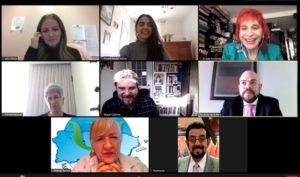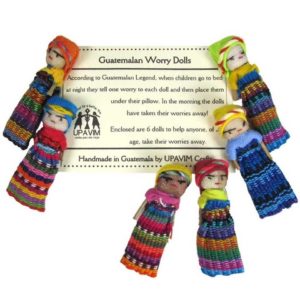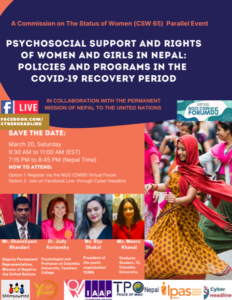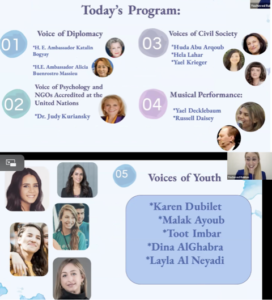Youth-led NGO CSW/NY Forum events about Migrant Latinx Women, Women in Middle East Peace, and Rights of Women and Girls in Nepal: Psychosocial issues in COVID-19 times
Dr. Judy Kuriansky, Sadikchhya Khanal, Julia Pearce, and Yocheved Rabhan
“Young women must be at the forefront of movements advocating for change,” Deputy Secretary-General Amina J. Mohammed has said, echoed by Houry Geudelekian, Chair of NGO CSW/NY Forum. Answering this call, young women moderated and co-organized parallel events at the Forum this March on SDG 5-related topics to “make a difference in the world,” addressing topics ranging from transgenerational trauma of Latina migrant women, to the rights of women and girls in Nepal, and women’s role in Middle East peacebuilding, through a psychosocial lens.
All three events were sponsored by the International Association of Applied Psychology (IAAP), an NGO affiliated with DGC and in consultative status with ECOSOC, and were inspired by their participation in the graduate school course at Columbia University Teachers College on “Psychology and the United Nations,” taught by the first author, Dr. Judy Kuriansky who represents IAAP at the UN.
Impressively, all three events followed SDG 17 about mutistakeholder partnership, bringing together representatives from civil society, women, youth, academia, media, and government.
Transforming Transgenerational Trauma of Latina Migrant Women
“Women play a critical role in migration and must not be seen as victims, but rather as agents of change,” said Fernando de la Mora, coordinator for Economic, Social, Human Rights and Humanitarian Affairs for the Permanent Mission of Mexico to the UN, at the event on “Mitigating Transgenerational Trauma of Latina Migrant Women to Achieve Empowerment”.
De la Mora, the one male in the team of four delegates who drafted the historic Global Compact on Safe, Orderly, and Regular Migration, described his country’s championing SDG 5, promoting a gender-perspective in their current Security Council term, and co-hosting the civil society–centered “Generation Equality Forum” that kicked off in Mexico City and concludes in the co-host country of France.
Adding that Mexico will also promote the importance mental health during their current Security Council term, de la Mora appreciated the input of psychologists on the panel, who elaborated salient cultural values and challenges of Latina migrant women.

Dr. Carmen Vasquez, a migrant herself, having emigrated from the Dominican Republic to the United States 25 years ago, is now Director of the Bilingual Treatment Program Clinic at Bellevue Hospital, offering services to the acculturated non-English-speaking Hispanic population. Placing Latinx transgenerational trauma in the historical context of holocaust survivors, she described relationship scripts of current and folk culture, including male Machismo and female Marianismo about feminine virtues like purity and moral strength; attitudinal Familismo indicating the powerful central value of family loyalty; and Simpatia, feelings of compassion and community.
Assistant Professor of Psychology at the University of Puerto Rico, Dr. Frances Boulon, emphasized that feeling “I am worthy” is key. A case described by psychologist Dr. Roy Aranda powerfully illustrated that point.
Education and training is also key, said psychology professor Dr. Miguel Gallardo, Director of Aliento, The Center for Latina/o Communities at California’s Pepperdine University.
That the issues for migrant women in the Arab region are similar was noted by Ms. Khawla Nasser AlDeen, a graduate student at American University in Beirut, Lebanon. Due to the COVID-19 pandemic, she said, Arab women and girl migrants and refugees living on the street or in asylum centers are at high risk to gender-based violence (GBV), abuse, trafficking, and developing mental health problems.
Psychologist Dr. Judy Kuriansky, who had advocated with the NGO Committee on Migration, congratulated Mexico on including references to psychosocial wellbeing in the Global Compact on Migration, and described psychological dynamics like “place attachment,” the meaning of home and sense of belonging.
Outlining coping mechanisms, she showed “Worry Dolls” she discovered years ago on a trip to Latin America, whereby you give your worries to small indigenously-dressed dolls placed under your pillow overnight, and wake up anxiety-free.

Psychosocial Support and Rights of Women and Girls in Nepal in the COVID-19 recovery period
The trauma caused by the COVID-19 pandemic inspired Meera Sadikchhya Khanal to help her Nepalese community cope, leading to a webinar at the height of the outbreak, followed-up a year later for the NGO CSW/NY Forum, addressing “Psychosocial Support and Rights of Women and Girls in Nepal: Policies and Programs in the COVID-19 recovery period.”

The event aligned perfectly with the Nepal government’s “national aspiration” about “Prosperous Nepal, Happy Nepali,” described eloquently by the Deputy Permanent Representative of the Mission of Nepal to the UN, Mr. Ghanshyam Bhandari.
“We have criminalized sexual discrimination and gender-based violence,” he said.
This good news set a positive stage for local NGOs to describe their work.
The Transcultural Psychosocial Organization (TPO) described by Mr. Suraj Koirala has stepped up provision of psychosocial support in Nepal in response to the pandemic, given survey results about increases in women’s workload and domestic violence.
Ms. Madhabi Bajracharya, Policy Advisor of IPAS Nepal, an NGO that advocates for reproductive rights, acknowledged two positive government acts, the Safe Motherhood and Reproductive Health Rights Act, and the Public Health Service Act, that lists reproductive services, including abortion, as “basic health services”.
Several young women described their youth-led NGOs.
Ms. Shilpa Lamichhane of Visible Impact, and Ms. Riju Dhakal, Director of Yuwa, each promote sexual health and reproductive rights (SRHR) of young people, including menstrual health, comprehensive sexuality education, and marriage equality, through workshops, product distribution, research, and social media awareness campaigns.
In her nonprofit SheEmpowered, Ms. Amiansu Khanal, created a grassroots movement against Chhaupadi, gaining support of police departments and parents to end the practice of “menstral exile” that keeps women and girls out of their homes during menstruation.
Supported by media partner Cyberheadline, questions from the public were gathered, reflecting fear, shame, and loneliness, answered with culturally-appropriate advice from psychologist Dr. Judy Kuriansky.
In the spirit of CSW to include the voice of males, high-school student Mr. Ashish Subedi, founder of a South-Asian advocacy organization, recited a touching poem of optimism about women’s empowerment, that “misogyny is still alive, but what’s livelier is our voices.”
Women’s Leadership and Psychosocial Perspectives in Middle East Peacebuilding
“One cannot speak about peace without speaking about women.”
These words of H.E. Ambassador Alicia Buenrostro Massieu, Deputy Permanent Representative of the Mission of Mexico to the UN, captured the essence of the NGO CSW/NY Forum event entitled, “Women’s Leadership Role and Psychosocial Perspective in Middle East Peacebuilding.”
Women’s role “has never been needed as much as it is today,” she continued, explaining Mexico’s “feminist national policy” and aim to highlight women’s role in peace and security, with “the language of mental health and psychosocial support” during their Security Council term.
Additionally, Mexico is co-hosting the civil-society-centered Generation Equality Forum, that kicked off in Mexico City and ends in the co-host country of France.
H.E. Ambassador Katalin Bogyay, 15th Permanent Representative of the Mission of Hungary to the UN, who has served as Vice President of the UN Women Executive Board, suggested that psychologists and diplomats “join forces,” to highlight mutually important skills, like listening.
“Women have a unique capacity to embody the role of peacebuilder and peacekeeper,” she said.
The Forum event was timely, given the Nita M. Lowey Middle East Partnership for Peace Act and Fund passed in the U.S. Congress to finance people-to-people peacebuilding programs, and in light of the Abraham Accords, whereby several Arab nations (UAE, Bahrain, Morocco, and Sudan) signed agreements normalizing relations with Israel.
That rapport was reflected in the Forum event by the moderating team of Yocheved Rabhan from Israel with Layla La-Neyadi from the United Arab Emirates.
Aligning with SDG 5 and 16, and target 3.4 about promoting mental health and wellbeing, the event highlighted the effectiveness of women’s “transformational” leadership style, theories of psychology, and efforts of female-led NGOs.
Psychologist Dr. Judy Kuriansky described the “contact hypothesis” whereby people collaborating in projects (e.g., cooking, climbing, learning computers) eases the divisive “us” and “them” mentality, as chronicled in her book, “Beyond Bullets and Bombs; Grassroots Peacebuilding between Palestinians and Israelis.”
This set the stage for speakers to describe their NGO partnerships for peace.

Hela Lahar, inspired by “being the granddaughter of three Holocaust survivors,” founded the OneVoice Movement, to “engage in constructive discourse and action around the Palestinian-Israeli conflict.”
Huda Abu Arqoub, a Palestinian woman and Regional Director of the Alliance for Middle East Peace (ALLMEP), described their network of people-to-people Palestinian and Israeli peacebuilders.
“Women have always been on the forefront of paying the price of any conflict,” she said, thus, they are positioned to be leaders to end the conflict.
Yael Krieger, an Israeli and COO of Our Generation Speaks, promoted “out of the box” innovations characteristic of youth.
Sports transcends differences, evident in Peace Players, founded by Karen Doubilet, and described by two young female youth in the program.
“Living in a Jewish community and going to only Jewish schools, I was only around Jews, until Peace Players changed everything,” recounted Toot Imbar, an Israeli. Simialry, Malak Ayoub, a Palestinian, explained, “At the beginning I tried to just ignore the Jews and not pass the ball to them, (but) we learned to become a team.”
Now Malak and Toot are best friends.
Kuwaiti Dina AlGhabra, also a student in Dr. Kuriansky’s “Psychology and the United Nations” class, explained her advocacy for psychoeducation “where everyone feels safe and can be heard” and where women “stand together”.
Music performances brought hearts together.
Platinum-award-winning Israeli-Canadian singer/songwriter and activist, and member of Women Wage Peace, Yael Decklebaum, founder of the Israeli folk band Habanot Nechama, performed her song, Prayer of the Mothers, with lyrics, “From the north to the south, from the west to the east, hear the prayer of the mothers, bring us peace.”
Internationally acclaimed musician Russell Daisey, who has performed at the UN and participated in worldwide peace missions with Dr. Kuriansky, humorously pointed out that he was the only male in the panel, and performed their original anthem, One in Faith, with the refrain, “Your faith, my faith, his faith, her faith, one in faith,”
Conclusion
All three events met their objectives, and posed recommendations, to:
* Foster ongoing partnerships among government, civil society, academia, youth, media, and other stakeholders, achieving SDG 17
*Highlight the role of women and girls to achieve the goals of UN Agenda SDGs 3, 5 &16, Universal Health Coverage, the Global Compact, UNWomen, NGO CSW/NY and all initiatives promoting gender equality interlinked with mental health and well-being.
All the young women moderators appreciated the rich new opportunities to engage with governments, experts in the field, and peers, that has spurred their passion, and personal and professional growth. Expert in Spanish, having studied in Argentina and served as a tutor and translator, Julia Pearce is energized about specializing in Bilingual Latina/o Mental Health for relationships and families. Meera Khanal reconnected strongly with her family and Nepali community, was proud of advances in her country’s support of women’s rights and committed to activism about women’s empowerment through SRHR and mental health support. Co-moderators Yocheved Rabhan and Layla AlNeyadi felt the power of teamwork as an Israeli and Emerati. As Yocheved said, she gained a “deep understanding of the importance of empathy, working together, and celebrating and empowering women to promote and create peace in a region I hold so dear.”
The UN call for “The future we need” and “The future we want,” holds great promise in the hands of these outstanding young women.
References:
* Article summarizing IAAP advocacy on SDG5 and other global goals at: https://iaapsy.org/site/assets/files/1082/apaw_vol1i3.pdf
**Migrant Women: http://cdn.filestackcontent.com/tCKJn8SGQXeFgpNUO0ku
**Women in Nepal: http://cdn.filestackcontent.com/IULI2gEwR62adp1EJ4me
**Women in Middle East Peacebuilding: https://ngocsw65forum.us2.pathable.com/meetings/virtual/GQXZNQjPMb284C5bD[/vc_column_text][/vc_column][/vc_row]
Podcast: Play in new window | Download
ABOUT US
The Global NGO Executive Committee (GNEC) was founded in 1962 to promote a closer working relationship between the United Nations and the non-governmental organizations (NGOs) affiliated with it. GNEC acts as a liaison between the NGO community and the UN's Department of Global Communications (UNDGC). GNEC provides strategic guidance to help NGOs become more effective partners of the UN.
SUBSCRIBE
If you would like more info about NGO Reporter, or wish to subscribe:
- GNEC - Copyright 2024


